June 11, 2018, was to be a date that would live in infamy, when the Federal Communications Commission (FCC) repealed the Obama-era net-neutrality rules. It was a decision met with widespread criticism throughout the country. Fire, brimstone, throttled Internet speeds, the silencing of minority voices, attacks on the LGBTQ community, and the end of the internet as we know it were all imminent, according to liberals. We would be getting the Internet “one word at a time.”
One year after the “day the Internet died,” let’s conduct a post-mortem on the post-mortem.
Starting with Bernie Sanders (I., Vt.), who declared that repealing net neutrality would be “the end of the internet as we know it.” He added that it would be “a disastrous decision, it will impact every American. It will give huge advantages to big corporations over small businesses, to big media companies over smaller media outlets.” Has any of this come to pass?
Meanwhile, Senate minority leader Chuck Schumer predicted that the Restoring Internet Freedom Order, as the administration called it, would make it impossible to stream content on your phone, and would cause shows to lag on Netflix. Ask Netflix whether its business has taken a hit: The Sandra Bullock thriller Bird Box obliterated its records this past December.
That self-appointed bastion of truth in journalism, CNN, echoed Senator Sanders’s opinion in a headline, opining that with the repeal of net neutrality, it was the “end of the Internet as we know it.”
Senator Ed Markey (D., Mass.) said that repealing net neutrality would “create a digital oligarchy that serves the wealthy few.” Senator Tom Udall (D., N.M.) said that “ISPs would create internet toll lanes” and would stifle innovation and competition. Senator Richard Blumenthal, who has exaggerated once or twice in his life, said that students, innovators, consumers, and entrepreneurs would all suffer because of the repeal. The Twitter account for the Senate Democrats sent a vertically aligned tweet, separated by paragraph breaks, in a hyperbolic attempt to show how burdensome an Internet without net neutrality would become.
The culture industry got in on the act. Hollywood stalwarts such as Cher, Avengers actor Mark Ruffalo, and Alyssa Milano sought to convince the masses that the net-neutrality rules were necessary for Americans to enjoy a throttle-free, open Internet. The tone was apocalyptic.
The ACLU piled on, saying that the quality of Internet connection and the content available on the Internet were “at risk of falling victim to the profit-seeking whims of powerful telecommunication giants.” Inserting class warfare into the fervor, they declared that the FCC could “favor the content providers who have the money to pay for better access.” Anything but net neutrality, we were told, would result in “authoritarian” rule of the World Wide Web.
Yet we’ve seen the opposite of the Internet Armageddon these sages predicted. Internet speeds actually increased by 40 percent in the United States last year. The data show that there has been a record number of broadband deployment in U.S. homes. Investment continued to grow in 2018, as the country, says the U.S. Telecom association, an opponent of Title II regulations, “expanded on the momentum shift we saw in 2017 when the FCC initially signaled its intention to restore a forward-looking regulatory framework for broadband.”
As the United States progress toward 5G, utility-style Internet regulations impede the development of new technology. The stubborn fact is that Americans have access to faster Internet than ever before. A year after the Restoring Internet Freedom Order went into effect, there have not been any attempts to limit access of content providers. ISPs have not changed the way they charge customers, and the doomsday scenario has not come to pass of an Internet where content is provided only on an à la carte basis.
Opponents of net neutrality could have made their case without channeling a dark, ominous, apocalyptic future. For example, some have argued that net-neutrality repeal would permit ISPs greater authority to promote their own services, limiting consumer choice. However, concerns such as these were all too rarely expressed in political rhetoric. Equating the repeal of net neutrality to an attack on the LGBTQ community, an attempt to silence marginalized people, or cutting off access to reproductive rights was an outlandish attempt to mobilize the Left’s political base. A year’s time has revealed as much.
